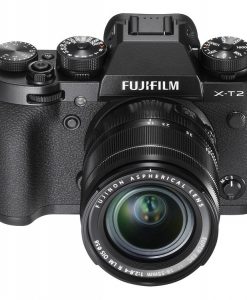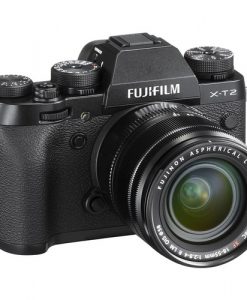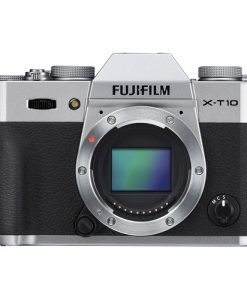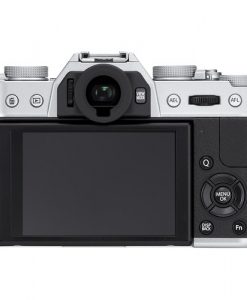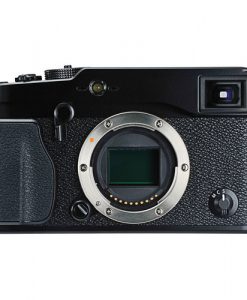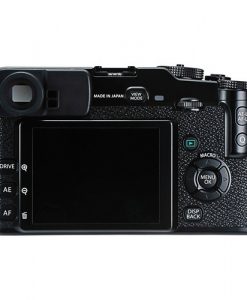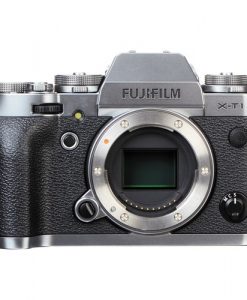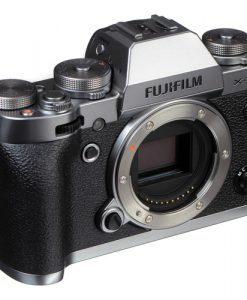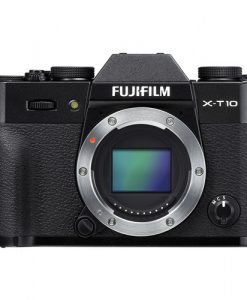Shop/Cameras/Nikon Cameras
Nikon D750 DSLR Camera with 24-120mm
24.3MP FX-Format CMOS Sensor
EXPEED 4 Image Processor
3.2″ 1,229k-Dot RGBW Tilting LCD Monitor
Full HD 1080p Video Recording at 60 fps
Multi-CAM 3500FX II 51-Point AF Sensor
Native ISO 12800, Extended to ISO 51200
Continuous Shooting Up to 6.5 fps
91k-Pixel RGB Sensor and Group Area AF
Built-In Wi-Fi Connectivity
AF-S NIKKOR 24-120mm f/4G ED VR Lens
Championing a multimedia approach to photography, Nikon’s D750 DSLR is an FX-format camera well-suited to both still imaging and video recording. Featuring a 24.3MP CMOS sensor, along with the EXPEED 4 image processor, this camera is capable of producing high-resolution imagery with smooth color gradations, low noise, and sensitivity to an expandable ISO 51200, at a continuous rate of up to 6.5 fps. In regard to video recording, full HD 1080p/60 is supported, along with the ability to record uncompressed video to an optional external recorder. Working from high and low angles is possible due to the tilting 3.2″ 1,229k-dot LCD monitor or, for remote shooting, the D750 also features built-in Wi-Fi connectivity. Designed for the contemporary image-maker, this DSLR is poised to benefit still photographers and videographers alike with the versatility and performance to match any working situation.
Benefitting the imaging capabilities of the D750, an equally apt 51-point AF system, with 15 cross-type points, is available and can be configured to utilize five AF points as a single focusing point in the Group Area AF setting for heightened initial subject recognition. The 3D Color Matrix Metering III system, along with the 91,000-pixel RGB sensor, also benefits the focusing abilities as well as provides accurate exposure metering to suit a vast array of subjects and lighting conditions. Furthermore, benefitting creative applications, the D750 supports in-camera creation of time-lapse movies with automated exposure smoothing, and a range of Picture Control profiles can be applied to refine the color and tonal handling of imagery.
Included with the D750 body is the Nikon AF-S NIKKOR 24-120mm f/4G ED VR lens; a versatile wide-angle to telephoto zoom that features a constant f/4 maximum aperture. A pair of extra-low dispersion elements and three aspherical elements control chromatic aberrations throughout the zoom range while a Nano Crystal Coating helps to reduce lens flare and ghosting for increased contrast and clarity. A Silent Wave Motor produces fast, quiet autofocus performance and Vibration Reduction image stabilization minimizes the appearance of camera shake to better enable working in difficult lighting conditions and with slower shutter speeds.
- 24.3MP FX-Format CMOS Sensor and EXPEED 4 Image Processor
- The 24.3MP FX-format CMOS sensor works in close collaboration with the EXPEED 4 image processor to produce rich image quality accentuated by low noise and notable sensitivity to a native ISO 12800, which is further expandable to ISO 51200. The sensor and processor combination further work together to realize a wealth of speed throughout the camera system, including a full-resolution continuous shooting rate of 6.5 fps and full HD 1080p/60 video recording. The sensor can also record imagery in DX format and will automatically switch to and support the use of DX-dedicated lenses when attached.
- Full HD Video Recording
- The EXPEED 4 processing power extends beyond still imaging performance to benefit full HD 1080p video recording in multiple frame rates up to 60 fps. During recording, fully manual control is possible over shutter speed, aperture, and ISO settings, along with the ability to utilize Auto ISO adjustment in manual mode. Zebra stripe highlighting can be applied to aid in controlling overexposure during recording, too, along with in-camera Picture Control profiles, custom tone curves, and a flat profile to benefit color grading applications. Additionally, multi-area mode allows you to narrow your effective field of view during recording, in FX and DX settings, to offer greater perspective versatility during shooting.
Recording to an optional external recorder is possible in order to gain uncompressed 4:2:2 8-bit output through the HDMI port and, when recording externally, use of the camera’s LCD monitor for live view monitoring is possible. Power aperture control is supported during external recording, too, as well as when recording to internal memory cards. Simultaneous recording to both memory cards and an external recording device is possible for instant backup and duplication of files, and 2MP 16:9 still images can also be recorded simultaneously during video recording. In-camera video trimming is possible as well, along with the ability to select the movie’s saving destination.
In regard to audio recording, an in-camera stereo microphone can be used or, alternatively, an input is available for utilizing an optional external stereo microphone. Sound levels can be adjusted across 20 levels prior to and during recording, along with the ability to monitor audio via the headphone output.
- 51-Point Advanced Multi-CAM 3500FX II AF Sensor
- Supporting the exceptional imaging capabilities of the D750 is an apt autofocus system that employs up to 51 distinct points, with options available to use 9, 21, or all 51 points depending on the situation, with AF detection sensitivity down to -3 EV. 15 cross-type points are also integrated within this array to provide even greater accuracy to centrally-located subjects. Benefitting the use of telephoto lenses and teleconverters, 11 of the focus points are also sensitive down to an aperture value of f/8. 3D Tracking, a part of the intelligent Scene Recognition System, also works to benefit maintained focusing on moving subjects for greater accuracy when shooting at high continuous shooting speeds.
For even faster initial focusing and subject recognition, five AF sensors can be used together as a single focus point with the Group Area AF setting. Furthermore, Single-point AF, Dynamic-area AF (with 9, 21, or 51 points selectable), 3D-tracking (using all 51 points), and Auto-area AF modes are also available.
When working in live view, for either still or movie shooting, a contrast-based AF system is employed to acquire focus precisely and can function in continuous, full-time servo mode to better-suit working with moving subjects. Four distinct AF-area modes are available when using the contrast-detection focusing method: Face-priority AF, Wide-area AF, Normal-area AF, and Subject-tracking AF.
- Scene Recognition System and Exposure Metering
- The intelligent Scene Recognition System with 3D Color Matrix Metering III utilizes a 91,000-pixel RGB sensor to evaluate and analyze all aspects within a scene, including brightness, contrast, subject distance, and the scene colors, to quickly determine an accurate exposure and white balance setting to best render the scene at hand. The information gathered is also checked against onboard reference images to ensure consistency from image to image in regard to exposure, white balance, i-TTL flash settings, and subject-tracking AF performance. Additionally, benefitting working in difficult lighting conditions, a highlight-weighted metering setting can be used to maintain faithful highlight reproduction.
- Camera Design Features
-
- A large 3.2″ 1,229k-dot LCD monitor is incorporated into the D750’s design, and features a tilting design to benefit working from high and low angles. Additionally, the screen features an RGBW color array to enhance visibility in bright conditions, and can be custom color balanced to match additional external monitors.
- A bright pentaprism optical viewfinder offers 100% frame coverage and incorporates an organic EL display system to clearly display shooting information for seamless adjustment over camera settings without removing your eye from the viewfinder.
- A built-in pop-up flash can be used to provide additional illumination to scenes and can also be used as a flash commander to wirelessly communicate with other Nikon CLS-compatible Speedlights. Additionally, a hot shoe is available for utilizing optional external flashes.
- Dual SD card slots are available to extend file saving capabilities by permitting either overflow recording or in-camera file duplicating. Additionally, optional HDMI-connected external recorders are supported for recording uncompressed video and time lapse sequences.
- A unique monocoque body design helps to lessen the overall weight and size of the camera for more comfortable use during long shooting sessions. The front of the camera and front cover are constructed from carbon-fiber reinforced thermoplastics, and the rear and top covers are magnesium alloy to present a well-balanced mixture of both durability and sleekness.
- The included EN-EL15 rechargeable lithium-ion battery pack provides up to approximately 1230 shots or up to 55 minutes of recording per charge (based on CIPA standards).
- Built-In Wi-Fi Connectivity
- Supporting a wealth of sharing and tagging possibilities, the D750 features built-in Wi-Fi connectivity to enable seamless transfer of imagery as well as remote shooting capabilities. Once the Nikon Wireless Mobile Utility app has been installed on an Android or iOS mobile device, you can use that device to browse the contents of the memory card, select images, and seamlessly transfer files between devices for immediate sharing online. Additionally, the mobile device can remotely trigger the shutter and display a live view image from the camera to enable working from a distance.
- Standards: IEEE 802.11b, IEEE 802.11g
- Communications protocols: 802.11b – DSSS/CCK; 802.11g – OFDM
- Operating frequency: 2412 to 2462 MHz (channels 1 to 11)
- Range (line of sight): Approx. 98.4′ / 30m (assumes no interference; range may vary with interference)
- Data rate: 54 Mbps (maximum logical data rates)
- Security: Authentication – Open system, WPA2-PSK; Encryption – AES
- Wireless setup: Supports WPS
- Access protocols: Infrastructure
For faster wireless performance, the D750 is also compatible with the optional WT-5A Wireless Transmitter and UT-1 Communication Unit, which can transmit image files via FTP.
- AF-S NIKKOR 24-120mm f/4G ED VR Lens
- The included 24-120mm f/4 lens covers an array of often used focal lengths, ranging from wide-angle to telephoto, and features a constant f/4 maximum aperture for consistent performance throughout the zoom range. VR image stabilization works to minimize the appearance of camera shake by up to 3.5 stops to benefit working in low-light conditions and a Silent Wave Motor provides fast, smooth, and quiet focusing performance that is well-suited to video applications. Two extra-low dispersion elements and three aspherical elements are integrated into the optical design to reduce aberrations and distortions and improve contrast, clarity, and color fidelity. Additionally, multi-layered Super Integrated and Nano Crystal Coatings have also been applied to lens elements to minimize flare and ghosting for optimized light transmission.
- Other Camera Features
-
- Pairing video and still imaging capabilities, in-camera time lapse shooting is possible using the built-in intervalometer to record up to 9999 consecutive exposures at variable intervals. Exposure smoothing can also be applied to groups of sequentially-recorded images in order to produce a naturally-appearing time lapse straight from the camera.
- Dedicated Photo Shooting and Movie Shooting menus aid in easily accessing dedicated settings and controls depending on the medium you are working with
- Special Effects modes can be applied to both still and video files for in-camera creative enhancement.
- Auto ISO sensitivity control allows you to select a minimum shutter speed at which camera shake can be controlled from and then will automatically set the ISO value in order to best render the scene. A maximum sensitivity level can also be set in order to maintain overall noise levels.
- Spot White Balance control for live view shooting makes setting the white balance as easy as pointing to the area in the frame that should be white.
- Picture Control modes allow you to set predefined looks to imagery in-camera and include Landscape, Monochrome, Neutral, Portrait, Standard, Vivid, Flat, and user-customizable settings.
- Special Effects modes allow you to creatively enhance imagery in-camera: Night Vision, Color Sketch, Miniature Effect, Selective Color, Silhouette, High Key, and Low Key.
- A range of scene modes can be employed to base exposure settings on pre-defined, detected scene types: Portrait, Landscape, Child, Sports, Close Up, Night Portrait, Night Landscape, Party/Indoor, Beach/Snow, Sunset, Dusk/Dawn, Pet Portrait, Candlelight, Blossom, Autumn Colors, and Food. Playback functions: Auto Image Rotation, Full-Frame and Thumbnail (4, 9, or 72 images or calendar), Highlights, Histogram Display, Image Comment , Movie Playback, Movie Slideshow, Playback with Zoom, and Slideshow.
- In-camera image editing: Color Balance, Color Outline, Color Sketch, D-Lighting, Distortion Control, Edit Movie, Filter Effects, Fisheye, Image Overlay, Miniature Effect, Monochrome, NEF (RAW) Processing, Perspective Control, Quick Retouch, Red-Eye Correction, Resize, Selective Color, Side-by-Side Comparison, Straighten, and Trim.
- Language support: Arabic, Bengali, Brazilian Portuguese, Bulgarian, Chinese (Simplified and Traditional), Czech, Danish, Dutch, English, Finnish, French, German, Greek, Hindi, Hungarian, Indonesian, Italian, Japanese, Korean, Marathi, Norwegian, Persian, Polish, Portuguese, Romanian, Russian, Serbian, Spanish, Swedish, Tamil, Telugu, Thai, Turkish, Ukrainian, and Vietnamese.














